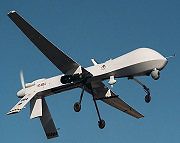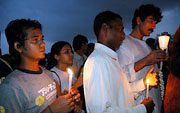Drones are becoming the future of warfare, but this requires a parallel development of an international framework to govern their use.
Author: Ann Wright
-
-
There is significant loss of faith and confidence in the ability of the government to address the threat posed by Boko Haram.
-
It remains to be seen whether the Nigerian government will continue with a predominantly military response to the terrorist group Boko Haram or pursue a negotiated settlement.
-
In this interview, Ali Dayan Hasan, Pakistan Director, Human Rights Watch, discusses the controversial US drone program in Pakistan, saying, “We don’t know what the drones are doing. We don’t know whether, in fact, they are hitting the right targets, or, for that matter, what those targets are, and what measures have been taken to ensure that civilians have been safeguarded.”
-
The 9/11 terrorist attacks led to the expansion of national counterterrorism legislation and policies, and many of these new laws circumvented civil liberties. In some cases, they criminalized non-violent activity such as slander of public officials or disturbances of public order. As a result, human rights groups mobilized in response.But lost in this advocacy has […]
-
Eric Rosand, Senior Advisor on Multilateral Engagement, Office of the Coordinator for Counterterrorism, Department of State, talked with IPI’s Ann Wright on July 19th about US multilateral counterterrorism activities.Listen to interview (or download mp3):Interview Transcript:Ann Wright (AW): Mr. Rosand, thank you for joining us today. The White House has released its National Counterterrorism Strategy, which […]









